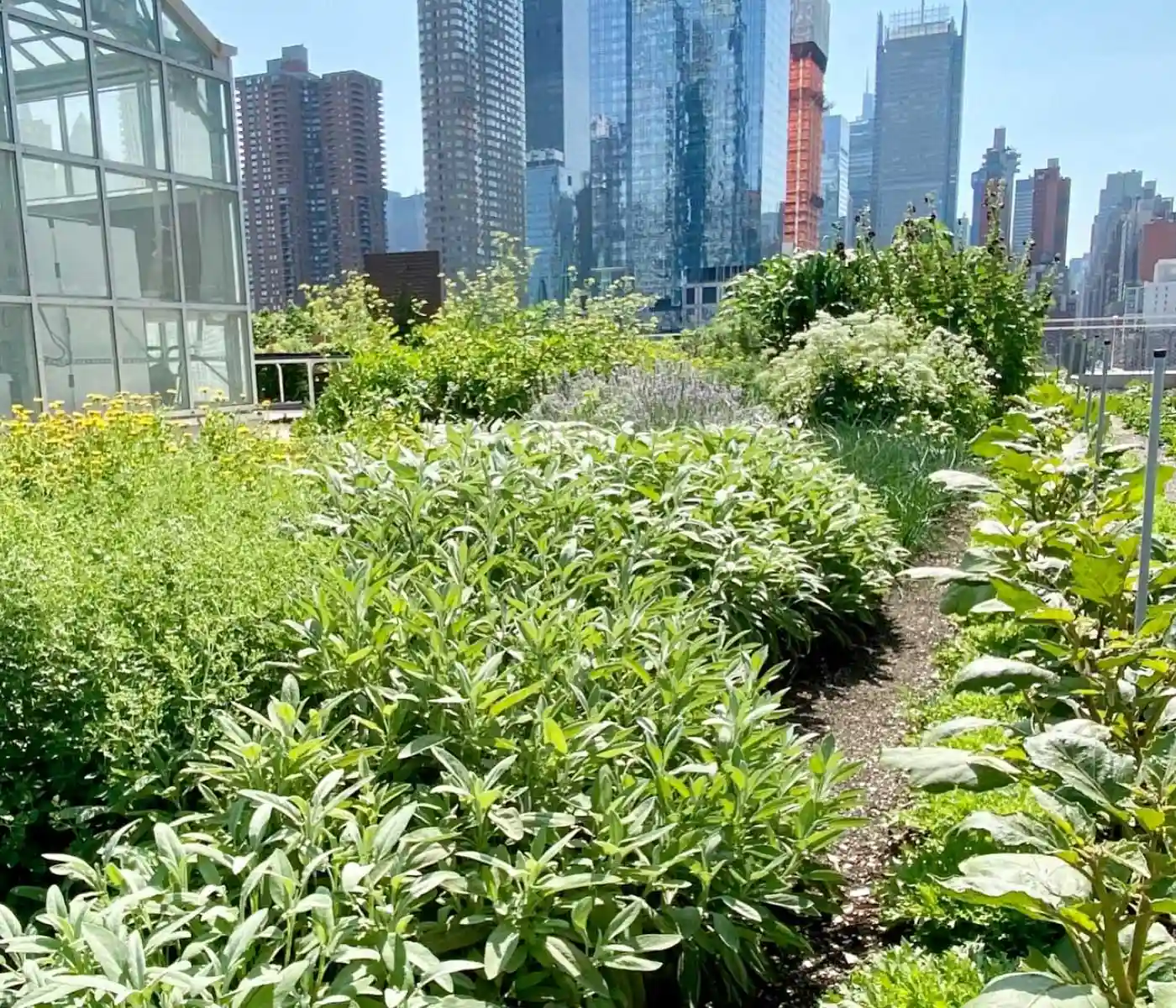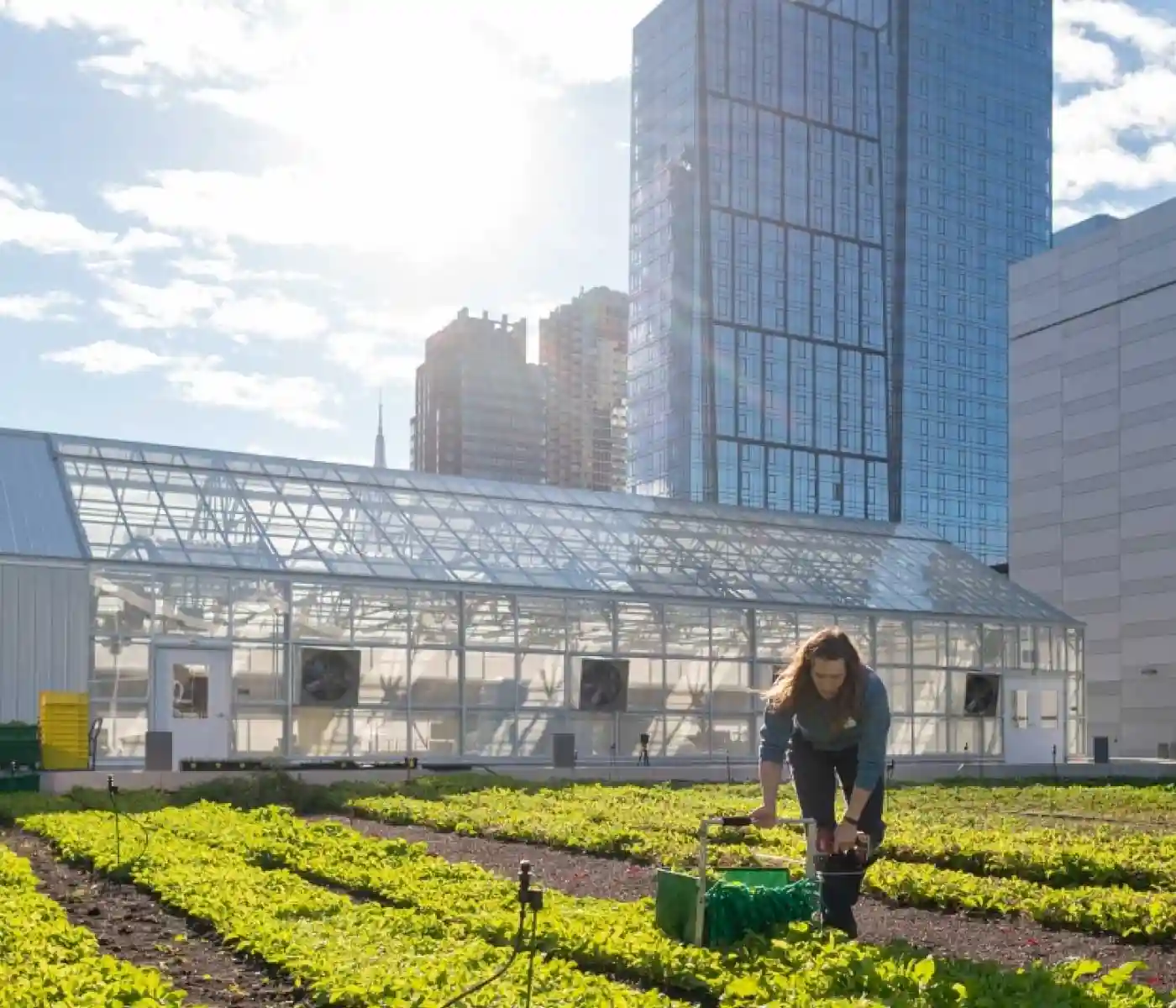
The Farm
Spanning one acre on the Javits Center rooftop, The Farm provides up to 40,000 pounds of produce a year that is incorporated into the meals we serve our guests.
The Farm Icon
This icon denotes CULTIVATED food and beverage items that are made with ingredients harvested from our rooftop Farm, Greenhouse, and Orchard.

The Greenhouse
The 3,500 sq ft all-season greenhouse is outfitted with a hydroponic growing system and benches for starting seedlings and growing micro greens.
A controlled environment allows for 365-day production and greater yields by providing consistent and near-ideal growing conditions. A vertical, stacked hydroponic system maximizes fields within a smaller footprint. Our 2023 crops include head lettuce, basil, edible flowers and culinary herbs.
TOTAL FOOD UTILIZATION
Total Food Utilization refers to using the whole ingredient and minimizing food waste from food preparation.
In the event that there is excess produce or even ugly produce,
CULTIVATED chefs employ these foods in pickings, purees, soups and more.
GREASE RECYCLING
The grease recycling program filters fryer oil to maximize usage and streamlines the changeover of spent oil with new oil. thespent oil then goes on to a second life
as fuel.
Food Rescue
Perishable produce, leftover food, bulk items, and excess prepped food are rescued and donated to local community partners.
Waste Management
All kitchens sort waste into various streams to optimize waste diversion. Streams include compost, plastic, metal, glass, cardboard/paper and landfill.
Water Coolers
We encourage the use of reusable water bottles by having many water coolers and refill stations throughout the building. Providing alternate water options like Farm-Infused Water with produce grown onsite in the roof top garden.
Skip The Straw
Strawless lids allow guests to sip their drinks without a straw.
The Bees
Jacob's Honey is the honey made from the hundreds of thousands of bees living in the 9 hives on the Javits Center green roof. The 120 pounds of honey harvested is used in the recipes and dishes served by CULTIVATED.

Waste Savviness
Becoming A Food Waste Champion
Levy’s Convention Center Division has made a commitment to having all of their management employees obtain certification with a course called “Becoming A Food Waste Champion”.
Our challenge is to stop wasting this precious resource; to rethink our menus, be inventive, and re-purpose ingredients we’ve grown accustomed to wasting. Doing so, will help strengthen our sustainability platform, reduce food costs, and it’s simply the right thing to do for our planet and for the next generations.
Waste Not 2.0
Built by Chefs for Chefs, Waste Not 2.0 is our proprietary, waste-tracking program, designed to change behavior with real-time tracking and reporting. Waste Not 2.0’s creates a positive impact by focusing on avoidable waste-reduction opportunities that go beyond trim, bones, cores, and peels.
Carbon Impact
We are committed to reaching net-zero greenhouse gas (GHG) emissions by 2050 and be carbon neutral on scope 1 and 2 GHG emissions by 2030. Our goals align with the science-based target criteria outlined by the Paris Climate Agreement, which seeks to prevent global warming by past 1.5 Celsius. We will work to achieve these targets through a variety of ways such as: redesigning our menus promoting plant-forward way of eating combatting food waste and electrifying our fleet.
Our Company Food Waste Programs
Waste Not 2.0
Stop Food Waste Day
Imperfectly Delicious Produce
Becoming a Food Waste Champion
Partnerships with Local Food Banks
Circularity
Reducing Single Use Plastics
We are committed to doing our part to reduce single-use plastics across the business. Levy’s parent company, Compass Group, was the first foodservice company to eliminate plastic straws. We provide alternative packaging solutions and marking materials that help educate guests to make the right decisions. We also encourage our client to prioritize reusables whenever possible and help them find products that best fit their needs.
To-go items are often necessary; therefore, we partner with the industry’s most recognized manufacturers to deliver a comprehensive disposables portfolio that includes earth-friendly, sustainable items. In addition, our leadership is constantly evaluating the supply chain and looking for new and better solutions to eliminate single-use plastics and help the industry choose better food packaging.
Better Bottled Water
We are dedicated to moving away from single use bottled water in our facilities. Many alternative solutions can be seen spanning across Levy’s Convention Center properties. Including using technologies such as Boomerang’s state-of-the-art filtration and bottling system, to provide our guests, clients, employees and partners with premium filtered water in convenient and returnable bottles.
Single Use Materials Decelerator Collaboration
We are a proud member of the Single Use Materials Decelerator (SUM’D), a collaboration of leading foodservice companies, environmental NGO’s and technical experts who have created an online scorecard that measures commonly used food ware and food packaging materials and scores them based on key sustainability attributes.
Community
Sustainable Sourcing
We are committed to serving food that will not only nourish our guests but will create change for a healthier planet. Levy, a sector of Compass Group, is proud to be a company that takes the lead on responsible sourcing practices. We were the first foodservice company to commit to purchasing sustainably caught tuna and cage-free eggs and other companies quickly followed our lead.
We prioritize our ingredients from local (less than a day’s drive) sources as a first choice, to support small and mid- sized American family farms. We also align our client’s goals around hyper-local with both hydroponic and in- ground gardens. Our goal is to ensure that a minimum of 25% of our purchases are from local sources by 2025.
Fair trade and other eco certified coffee is readily available in our supply chain. Including Change Please Coffee, an organization where 100% of their profits goes towards training and employing people experiencing homelessness as baristas, while supporting them with vital services.
We have also taken a leadership role within the foodservice industry regarding farm animal welfare, and have a robust Animal Welfare Policy. Additionally, we serve wild caught and aquaculture seafood that aligns with the Monterey Bay Aquarium’s Seafood Watch Program.
We Support…
Regenerative Farming Practices
Plant Based Meat Alternatives
The Efforts of farmers and laborers and small and diverse suppliers Decreasing Deforestation
Javits Center is Featured on PartySlate
Looking for inspiration for your next event at the Javits Center? Check out our PartySlate profile to discover how you can transform our space for your next event.